Volgograd blasts: IOC 'confident' Games will be safe
- Published
Oleg Boldyrev at the scene of the attack: 'Investigators are trying to determine the exact causes of the blast'
The International Olympic Committee president says he has confidence that Russian authorities will deliver a "safe and secure" Games in Sochi.
Thomas Bach wrote to President Vladimir Putin to express condolences for the "despicable" attacks that struck Volgograd within 24 hours.
Investigators say the attacks on a railway station and trolleybus, which killed at least 31 people, were linked.
They struck just over a month before the Winter Olympics begin.
Volgograd was also targeted in October, when a suspected female suicide bomber killed six people in an attack on a bus.
It is being widely assumed in Russia that the people who carried out the Volgograd bombings were involved in the Islamist-inspired insurgency against Russian rule in the Caucasus republics of Chechnya and Dagestan, and that the target was the Games, says the BBC's Moscow correspondent Daniel Sandford.
In a statement, Russia's foreign ministry did not blame any particular group but likened the attacks to acts by militants in the United States, Syria and elsewhere.
It called for international solidarity in the fight against "an insidious enemy that can only be defeated together", reported Reuters news agency.
Regional Governor Sergei Bozhenov said the bombings were a "serious test" for all Volgograd residents and all Russians.
Russians nervous
Investigators say at least 14 people were killed in a suicide bombing on a trolleybus in Volgograd on Monday morning.
It came a day after 17 people died in another suicide attack at the central station in the city. Scores were injured in the two attacks.
In his statement, external, Mr Bach said he was "certain that everything will be done to ensure the security of the athletes and all the participants of the Olympic Games", which open on 7 February.
But correspondents say despite intense security in Sochi, Russians are palpably nervous that following these attacks in Volgograd - which lies 700km north-east of Sochi - bombers could also strike elsewhere.
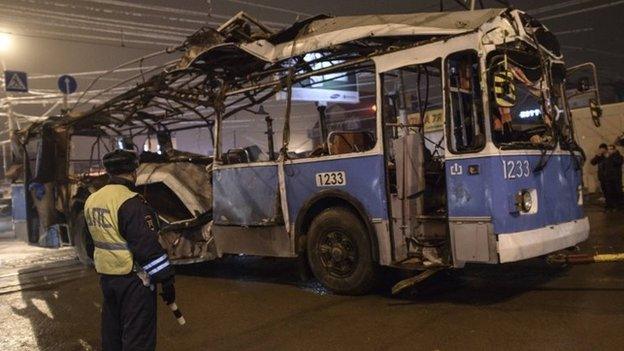
The ferocity of Monday's attack was evidenced by the damage done to the trolleybus
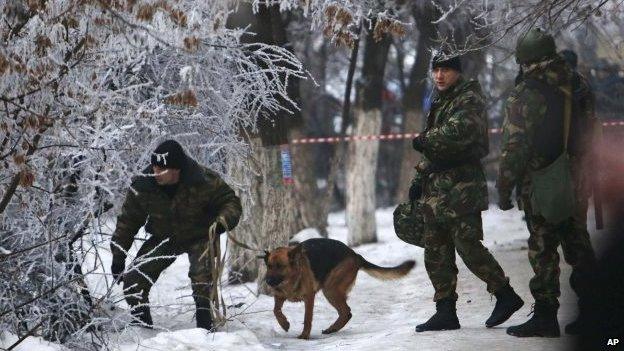
Police cordoned off the site of the explosion as they looked for clues
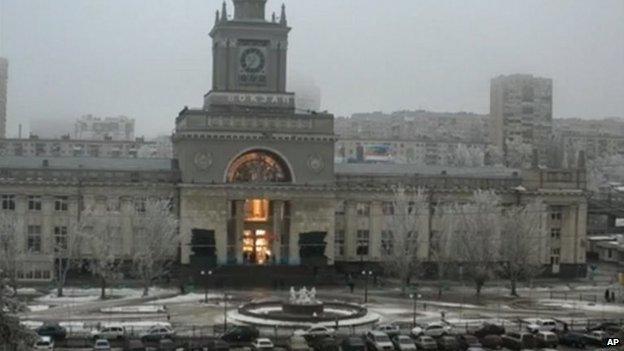
The explosion was the second in the city in 24 hours. A blast hit a train station on Sunday.
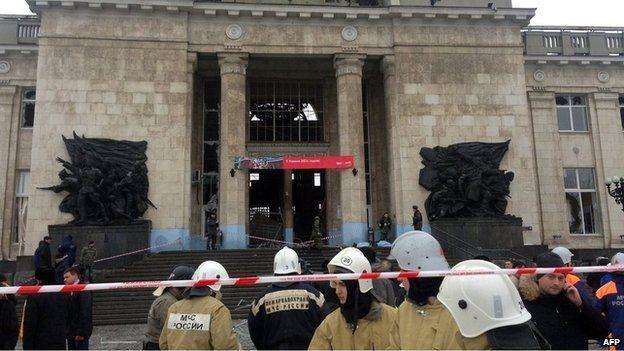
Sunday's explosion blew out many windows, and sent debris down the station steps
No-one has admitted carrying out either bombing, but they came several months after Chechen rebel leader Doku Umarov threatened new attacks against civilian targets in Russia, including the Olympics.
Vladimir Markin, a spokesman for the Investigative Committee - Russia's main federal investigating authority - said identical explosives were used in the two attacks.
"This confirms the theory that the two attacks are linked. It is possible that they were prepared in the same place," he said.
President Putin has ordered security measures to be tightened across Russia and in particular in Volgograd.
The US condemned the attacks, external and offered its "full support to the Russian government in security preparations for the Sochi Olympic Games".
The UN Security Council said its members, external condemned "in the strongest terms" the "criminal and unjustifiable" acts.
UK Prime Minister David Cameron said on Twitter, external he was "shocked and saddened" by the attacks, and offered Moscow whatever help was needed.
Busy market
The latest explosion took place near a busy market in Volgograd's Dzerzhinsky district.
Maksim Akhmetov, a Russian TV reporter who was at the scene of the blast, said the trolleybus was packed with people going to work in the morning rush hour.
He described the scene as "terrible", adding that the bus was "ravaged" and that there were "bodies everywhere, blood on the snow".
Health Minister Veronika Skvortsova said the injured include a pregnant woman, two 16-year-olds and a baby aged about six months whose parents are assumed dead.
The regional governor announced five days of mourning.
The force of the explosion removed much of the bus's exterior and broke windows in nearby buildings.
The blast took place at a busy time on a busy route, as Daniel Sandford explains
"It is now possible to preliminarily say that the explosive device was set off by a suicide bomber - a man whose body fragments have been collected and sent for genetic testing," the Investigative Committee said in a statement.
The first blast rocked Volgograd-1 station at lunchtime on Sunday, when it was packed with people travelling to celebrate the New Year.
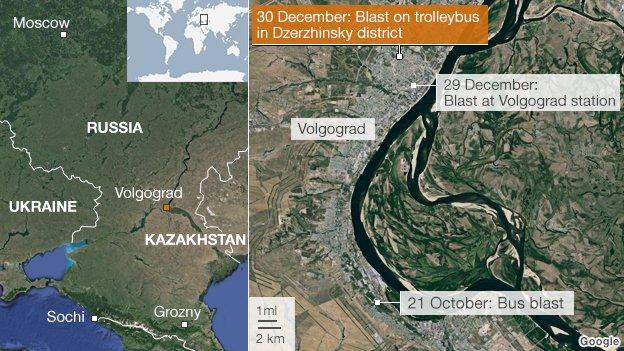
An Islamist insurgency in the North Caucasus region has led to many attacks there in recent years.
Insurgents have also attacked major Russian towns.
- Published29 December 2013
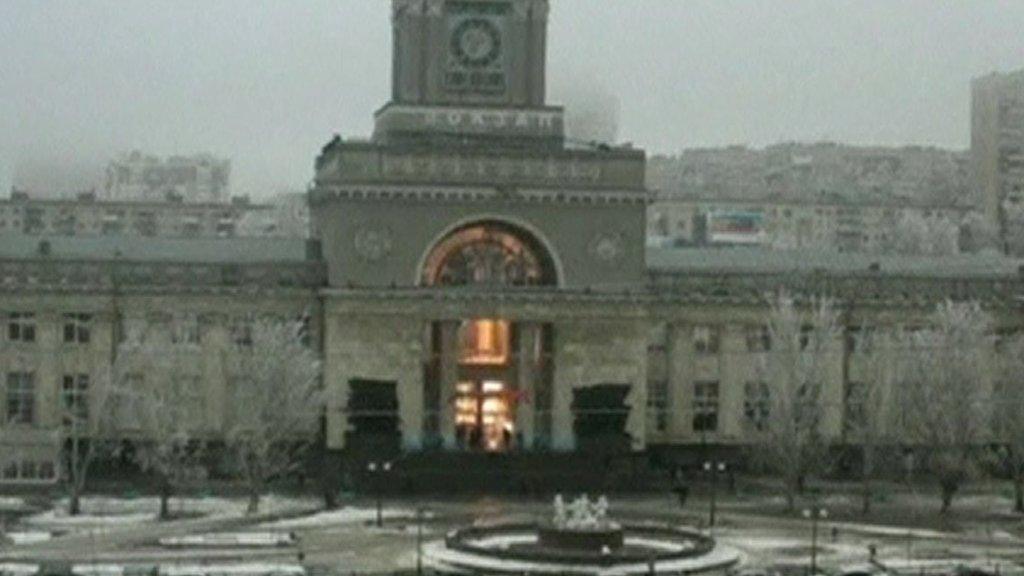
- Published7 November 2013
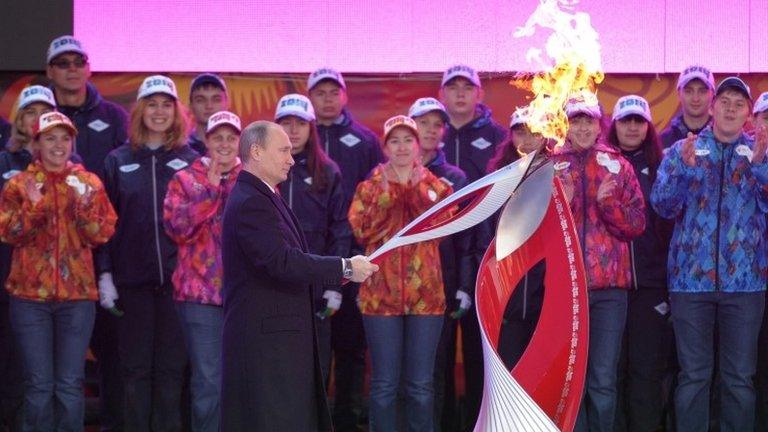
- Published21 October 2013
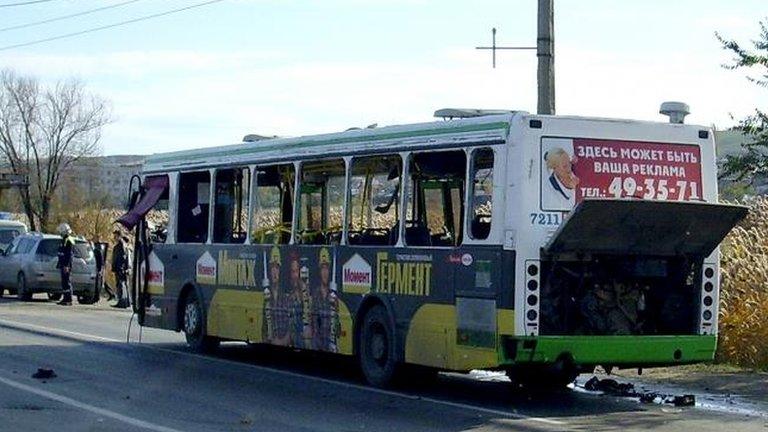
- Published25 March 2024
